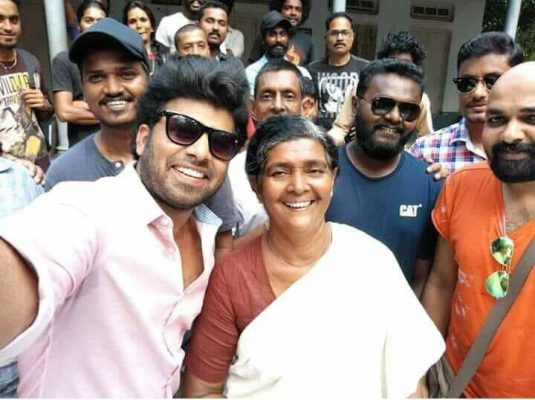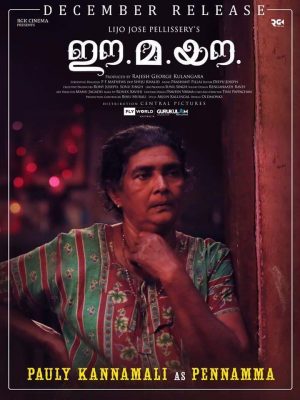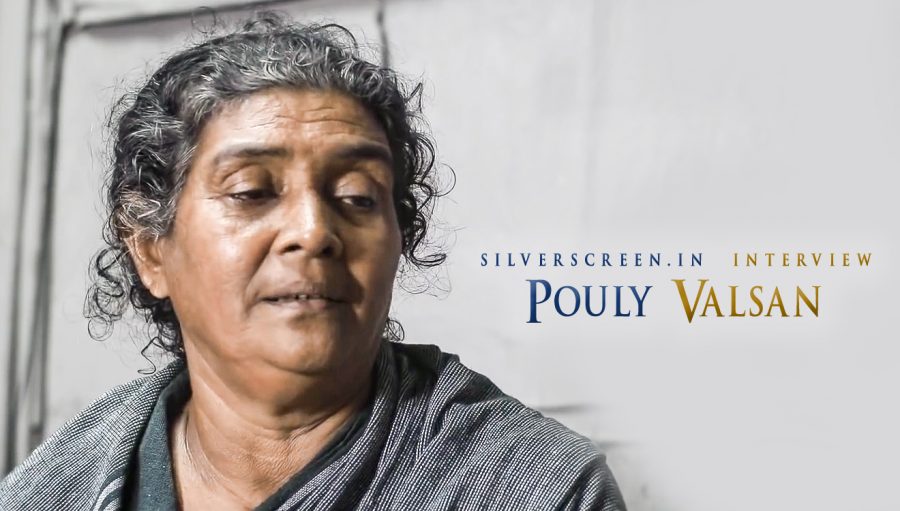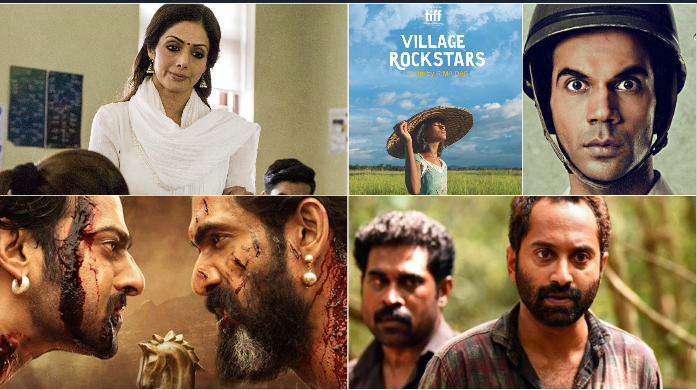Pouly Valsan, the recent winner of Kerala State Film Award for Best Character Artiste, is perhaps a relatively new entrant to cinema, but the stage is an old friend of hers. After 37 years in professional theatre, she made her film debut with a cameo in Anwar Rasheed’s Annan Thampi, and followed it up with Iyyobinte Pusthakam, Kullante Bharya, Onnum Mindathe and Guppy in small, yet noticeable roles. In 2017, two off-beat films, Rahul Riji Nair’s Ottamuri Velicham and Lijo Jose Pallissery’s Ee Ma Yau, provided Pouly with the artistic opportunity she had been long waiting for. Her performance in the movies, which are currently doing their film festival circuit, is winning her acclaim.
It isn’t hard to find Pouly Valsan’s home in Ochanthuruth, a village that lies in the lap of mangrove forests and lagoons, a part of Kochi’s Vypeen island. Along the lanes, towards her house, are flex-boards announcing her State Award win. Pouly’s is the last house on a narrow strip of land surrounded by a lagoon on three sides, a little away from the main road connecting the village to the outside world. The water level rises and touches the rim in the evening, says her husband Valsan, pointing at the shallow pool ahead of us.

The sixty-year-old veteran artiste has always lived here, even when she was at the peak of her career, travelling across the state with reputed theatre companies. “Vypeen is a hub of artistes. When you live here, art comes to you naturally, as if it’s in the air you breathe,” says Pouly. Her father, John, a fisherman, used to take his seven children to watch shows staged by local amateur theatre groups, and also, Chavittu Natakam, a traditional dance-drama form of Kerala’s Latin Catholic community. So it is only natural, an organic extension of her past, that she should win the State Award for portraying a Latin Catholic woman from old Kochi.
“Here, during a funeral, someone sits by the side of the corpse and cries loud enough for every visitor to hear. There is a unique tune to that wail,” Pouly says, explaining her character, Pennamma, in Lijo Jose Pallissery’s Ee Ma Yau. Incidentally, in her film debut, she’d appeared in a comic cameo, playing a similar character. Annan Thampi, directed by Anwar Rasheed, features her in a scene with Mammootty and Suraj Venjarammood, as a woman animatedly wailing near her husband’s corpse. The scene elicited a lot of laughter in theatres.
It was Benny P Nayarambalam, the dramatist-screenwriter, who recommended Pouly to Anwar. “I had essayed a similar comic role in a play that Benny wrote many years ago. When the news of the award broke, it was Benny who informed me of it, “she says. “We were busy at home that day, and I had a shoot in the afternoon for French Viplavam. I was waiting for the unit vehicle when I got a call from Benny. We hadn’t turned on our television or radio that day, and weren’t aware of the State Award announcement. Soon, my son came running to me, and my younger sister, after watching the news on TV, called to congratulate. It was my sister’s grand daughter’s birthday, and that evening, we celebrated both events together. Music, dance..,” she laughs.
*****
Translating Pouly’s quintessential Kochi dialect to English is a crime; like separating soul from a body. There is music to her language that is untranslatable.
Although Pouly has played fantastic roles in countless dramas in her 37-year-long career in professional theatre, she had never received a State Award. “I haven’t kept a count of the number of stages I have performed on. Several troupes, several plays and stages…”
Pouly worked in theatre at a time when the art form flourished in the state. “In early 70s, when I had just started out, I heard a lot about veteran drama-artistes like Thilakan and PJ Antony who had a troupe called PJ Theatres in Perumbavoor – a thriving center for drama artistes,” says Pouly. Kuthiravattam Pappu, who would later become a renowned actor in Malayalam cinema, was working with another troupe in Perumbavoor during that time. Over the years, Pouly collaborated with some of the best artistes and writers in the field.
“I worked with PJ Antony for five years before moving on to other troupes like Maithri, Kochin Nataka Vedi, Carmel Theatres, Kalashala, Rajan P Dev’s troupe..,” she recounts, having travelled across the state as part of work. “For a year, a troupe would travel from one stage to another performing the same play. It involved a lot of hard work. Those days, every day on my calendar would be marked with the Malayalam letters “Na” (Naatakam) and “Re” (Rehearsal).”
Rehearsals used to be very strict, she says, “Especially with people like Anthony chettan. He would insist that everyone in the crew, including the fellow who is in charge of the curtain, should be present during the rehearsals. He was particularly adamant about getting the perfect production props. I had the best time there, training under all these exponents. When I was leaving the troupe, he affectionately blessed me saying everyone who trained under him have become successful artistes.”
*****
“As a child, I used to make up scenes, situations and enact them as though I am a stage actor. One day at school, while the Malayalam literature class was going on, I started reading aloud a chapter about Buddha, acting out the lines of Buddha and his disciple. Suddenly, the classroom turned quiet, and everyone turned around to look at me reading out the dialogues oblivious to the presence of the others,” she laughs.
The convent school she attended honed her talents. “Every month, they had cultural events. We staged skits, biblical dramas, musical programmes. I was always cast in male roles, dressed up as a little boy since I was tall, and had thick curly hair.” Once, the professional orchestra team that was hired by the school recommended her to a professional theatre group who were looking for a child actor. “I was worried if Appachan would allow me, but he agreed to let me act since it was a one-off case. Later, when opportunities began coming in one after another, he asked me to focus on school,” she says.
Eventually, Pouly had to take up acting as a full-time job to support her father financially. “I was the eldest of the siblings. When appachan found it hard to fend for the family single-handed, I chipped in.”
During those days in Kochi, theatre wasn’t an unusual career choice. There were several amateur theatre groups in the island city. Gradually, Pouly became a regular in every drama made in the area. Although she did many roles, it was her flair for comedy that made her popular.

Theatre is a very powerful form of art, she says. “Once in a play, I donned the role of a 35-year-old unmarried sister of a doctor. She starts a physical relationship with a man who comes to consult her brother, and when the latter objects to the relationship, she confronts him. There is a lengthy dialogue that I deliver then. I can’t recall it now,” she says. “That play was a huge success, and when I reached home after performing the play on various stages in north Kerala, I received a letter from a group of women from Kannur; they were quite inspired by the play,” she recounts.
In the 70s and 80s, Pouly worked on several social and political dramas that fearlessly attacked the corrupt social system. She tells me about Chuvanna Chakravalam, a staunchly leftist anti-caste drama which was directed by a dramatist named Jaleel. “I don’t know if that kind of gutsy work of art would be possible now.”
Pouly was a part of PJ Antony’s political drama, Kalarathri, which was set in the backdrop of the Emergency. The drama attacked ministers, politicians and police officers over the Rajan murder case. She played Rajan’s mother, the wife of Prof. K Eachara Warrier. “Instead of being censored or criticised, it got tremendous ground support. Since there was a curfew in place, we had to switch off microphones and electric lights post 10 pm. But the crowd never waned. That period saw a lot of courageous artistes and writers,” she says, and adds, “The advantage of working in political dramas is that your dialogue delivery skills improve. You have to render the dialogues confidently, facing the audience. For every dialogue, the audience cheers and that raises your spirits,” she says.
*****
Theatre also made her stronger as a person. From a corner of Vypeen, she travelled across the state, far and wide, often unaccompanied. In a field known for exploitation, Pouly held her own. When it came to marriage, she stood up for love, defying social barriers.
Pouly points to the expanse of backwaters by the side of the house, and says, “Valsan chettan lived in a house across that field. We grew up together, and at one point, we decided to get married.” He belonged to a Hindu family and she, a Latin Catholic. “Even now, people misspell his name, call him Wilson, a Christian name, because they don’t know I am married to a Hindu.”
“I wonder how I had the courage to stand up for love at that young age,” she says.
After the wedding, Pouly was ostracised by her family. Although the new and old relatives lived in the same neighborhood, they wouldn’t speak to her, or even look at her. The ice melted many years later. After the birth of their second child, Valsan was baptized and became a Christian, not because of familial pressure, but to give the children a hassle free life.
Valsan, who has a talent for music and literature, was working as a security guard until recently. “Filmmaker Amal Neerad has an apartment in the building where he works. But he wouldn’t go and talk to Amal. He is so shy. He says why would such a big director talk to a lowly security guard,” she laughs. “I have worked in Amal’s Kullante Bharya. They are nice people.” Valsan has now quit his job due to bad health. Their younger son, a post-graduate in music, has inherited his music genes.
*****

pouly2
These days, I get a role in most films shot in Kochi, she says. “Usually, they notify me a couple of days before the shoot, but for Ee Ma Yau, I was called at short notice. They had initially brought another artiste, but she had to be replaced. Lijo got furious, and someone sent for me in the middle of the night.”
In Ottamuri Velicham, she played a woman from rural Thiruvananthapuram, which meant that she had to speak the Thiruvananthapuram accent of Malayalam. “There were people to help. Did I do it right?” she asks. The film was shot in a forest hamlet in Bonacaud, with most scenes set inside a one-bedroom house. It is a sombre film that explores the theme of marital rape. Pouly is full of praises for the actors who worked with her in the film. “That girl (Vinitha Koshy) has done a mind-blowing job!” she says in her amusing Kochi tongue.
“I think the film that worked as a charm for me was Kullante Bharya. It was a short film, and I had just a couple of scenes. When I met Anjali Menon on the sets of her new film in Ooty, she told me that after watching Kullante Bharya, she had asked after me. Rahul (Rahul Riji Nair) too cast me in his film after watching my performance in Kullante Bharya.”
Rahul, a first time director, met Pouly in her house in Vyppin, and narrated the script to her. “He asked me if I can do the Trivandrum slang. I said why not, I am an actor. I should be able to do anything!”
*****
Ee Ma Yau is an entirely different experience, she says. “The crew was big. They used rain in every scene. During the shoot itself, I knew this would turn out to be marvelous. Lijo is a very strict director. I think everyone on the set was a little scared of him. He is a perfectionist, and he was well-planned. They completed the film in 26-27 days. I knew I could do breeze through the role because it’s my kind of character – someone from Kochi speaking the local language.”
Pouly recently completed shooting for Anjali Menon’s film in which she has a full-fledged character role. “Anjali is a good director, and better, she is a great human being. She is intelligent, she manages the set so well. She treats everyone alike, irrespective of class or status. Parvathy and me were treated alike, although Parvathy is a much bigger star. Coincidentally, Parvathy and I won State Awards this year (laughs). I hope it’s a good omen for the film.”
Pouly admits that cinema is a more comfortable profession than theatre, both in terms of physical effort and monetary compensation. “In theatre, you don’t get paid in proportion to the effort you make. Not that it doesn’t pay, but in comparison, the money is less. When I started working, my pay was Rs 35. I think a senior artiste these days earns around Rs 2,000. Nevertheless, it was theatre that helped my household come out of debts. Although I never became wealthy, this profession helped me earn enough to lead a happy life.”
The artistic satisfaction that comes with theatre is unparalleled, Pouly declares. “No matter how tiring we are physically or mentally, we would forget all that once we get into the acting mode. There have been instances when I readily performed on stage ignoring bad health. I had undergone a surgery once, and before I could recover from it completely, I was approached by a troupe requesting me to play a part as an artiste in their team had suddenly fallen sick. I agreed.”
*****
“Hard work has become less important,” observes Pouly about the current generation of actors. “Earlier, fame didn’t come easily. One had to practice hard, wait, perform a play on a few stages to earn a name. Now, anyone with a selfie-equipped camera can be one. They call it smartness. You can’t complain. That’s where the money is.”
Actor Suraj Venjarammood, who had founded an epic drama troupe in his home town a few years ago, had to discontinue it recently after he found no takers for theatre among youngsters. “In south Kerala, theatre is facing a very tough time. In the northern parts of the state, there are a few troupes that continue to survive, doing good work,” says Pouly. “The present generation doesn’t know much about the rich theatre heritage we have. When they mention Thilakan, they almost never talk about his robust career on stae.”
Recommended
I ask Pouly if she feels she could have entered cinema much earlier. “No. There was no one to take me to film sets at that time. It’s not prudent to go alone to a place about which I know nothing,” she says.
Although Pouly has now retired from full-time professional theatre, her heart is still in it. “I am actively involved in an informal group of artistes – actors, musicians, writers and technicians – from Old Kochi. Many old colleagues called me when they heard the news of the award. We meet every year on World Theatre Day in Fort Kochi. That’s a day we never miss, no matter how busy we are with our lives.”
As we wrap up the interview, Pouly and Valsan insist that I lunch with them. When I politely refuse, they worry. “Won’t you be hungry? Don’t you have a long way home?”
*****
The Pouly Valsan interview is a Silverscreen exclusive.



